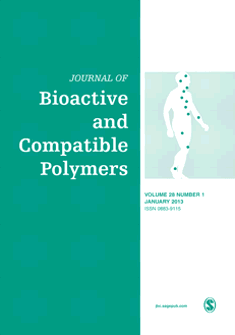
Biomedical Materials
Scope & Guideline
Transforming Science into Life-Saving Solutions.
Introduction
Aims and Scopes
- Tissue Engineering and Regenerative Medicine:
Research in this area focuses on the design and application of scaffolds and biomaterials that facilitate tissue regeneration and repair. This includes the development of 3D printed scaffolds, hydrogels, and bioactive composites that mimic the natural extracellular matrix to support cell growth and differentiation. - Drug Delivery Systems:
The journal publishes studies on the formulation and evaluation of novel drug delivery systems, including nanoparticles, liposomes, and hydrogels, aimed at improving therapeutic outcomes and targeting specific disease sites. - Biocompatibility and Safety Assessments:
A significant emphasis is placed on evaluating the biocompatibility of new materials and their biological interactions, ensuring that the developed biomaterials are safe for clinical use. - Nanotechnology in Medicine:
Exploration of nanoscale materials and their applications in medical technologies, including imaging, drug delivery, and therapeutic agents, focusing on how their unique properties can enhance medical treatments. - Biomimetic Materials:
Research on materials that replicate the properties and functions of natural biological tissues, aiming to improve integration and performance in medical applications.
Trending and Emerging
- Advanced Bioprinting Techniques:
The use of 3D bioprinting and related technologies is on the rise, with studies focusing on creating complex tissue structures that include vascularization and cellular heterogeneity. - Smart and Responsive Biomaterials:
Emerging materials that respond to environmental stimuli (such as pH, temperature, or light) are increasingly being explored for applications in drug delivery and tissue engineering. - Integrative Approaches in Biomaterials:
There is a growing trend towards integrating different disciplines, such as nanotechnology, bioengineering, and molecular biology, to develop comprehensive solutions for complex medical challenges. - Personalized Medicine and Patient-Specific Solutions:
Research focusing on personalized approaches, including patient-derived materials and tailored biomaterials for specific applications, is gaining traction. - Sustainable and Eco-Friendly Materials:
An increasing number of studies are highlighting the development of sustainable biomaterials derived from natural sources or designed to be biodegradable, addressing environmental concerns in biomedical applications.
Declining or Waning
- Traditional Biomaterials without Modification:
There has been a noticeable decline in studies focusing solely on traditional biomaterials like simple polymers or metals without modifications. The trend is moving towards more complex, engineered materials that incorporate nanotechnology or bioactive components. - Single-Function Biomaterials:
Research focusing on biomaterials with a single function (e.g., only structural support) is waning. There is a shift towards multifunctional materials that can provide structural support, drug delivery, and biological signaling. - Static In Vitro Testing Methods:
The use of static in vitro testing methods is decreasing in favor of more dynamic models that better mimic in vivo conditions, such as organ-on-chip technologies or bioreactor systems. - Focus on Basic Material Properties:
There is less emphasis on purely characterizing basic material properties (e.g., mechanical strength, chemical composition) without correlating these properties to biological outcomes or functionalities.
Similar Journals

JOURNAL OF BIOACTIVE AND COMPATIBLE POLYMERS
Advancing the Frontiers of Polymer ScienceJOURNAL OF BIOACTIVE AND COMPATIBLE POLYMERS, published by SAGE PUBLICATIONS LTD, serves as a pivotal platform for disseminating innovative research in the fields of bioengineering, biomaterials, materials chemistry, and polymers. With an ISSN of 0883-9115 and an E-ISSN of 1530-8030, this journal is committed to the advancement of knowledge relating to the interaction of polymers within biological systems and their compatibility in various applications. Operating since 1986, the journal has garnered a respectable presence, ranked in the Q3 quartile across multiple categories in 2023, indicating its relevance and contribution to these dynamic fields. Although not open access, the journal ensures that high-quality research is accessible to subscribers and institutions, reinforcing its importance for researchers, professionals, and students aiming to stay abreast of advancements in polymer science and biocompatibility. By fostering interdisciplinary communication and collaboration, the JOURNAL OF BIOACTIVE AND COMPATIBLE POLYMERS continues to play a crucial role in shaping the future of material applications in health, technology, and industry.

JOURNAL OF BIOMEDICAL MATERIALS RESEARCH PART B-APPLIED BIOMATERIALS
Advancing the Frontiers of Biomaterials InnovationJOURNAL OF BIOMEDICAL MATERIALS RESEARCH PART B-APPLIED BIOMATERIALS, published by Wiley, is a leading journal in the field of biomaterials and biomedical engineering, with an impact factor reflected in its relevant Scopus rankings—including a Q2 position in Biomedical Engineering and Q3 in Biomaterials for 2023. This journal, with ISSN 1552-4973 and E-ISSN 1552-4981, serves as a vital platform for disseminating pioneering research and innovative applications of biomaterials. Positioned in the United States, it aims to bridge the gap between material science and biological applications, fostering collaboration among researchers, professionals, and students dedicated to advancing technology in healthcare. With a convergence of studies from 2003 to 2024 and a growing focus on open access, the journal ensures greater visibility and accessibility for groundbreaking research. Join us in exploring the dynamic field of biomaterials, as we push the boundaries of science and engineering for improved patient outcomes.

Acta Biomaterialia
Advancing the Frontiers of Biomaterials ResearchActa Biomaterialia, published by Elsevier Science Ltd, is a leading journal in the fields of biochemistry, biomaterials, biomedical engineering, biotechnology, and molecular biology. With an ISSN of 1742-7061 and an E-ISSN of 1878-7568, this prestigious journal has secured a remarkable position in the academic community, evidenced by its inclusion in the Q1 category across multiple disciplines for 2023. It ranks impressively at #21 in biochemistry, #16 in biomedical engineering, #18 in biotechnology, and #11 in biomaterials, reflecting its high impact and relevance to ongoing research and development. The journal provides a platform for disseminating innovative research and advancements in the design and application of biomaterials, contributing to scientific discussions that propel the field forward. Although it does not currently offer open access options, Acta Biomaterialia continues to attract contributions that advance our understanding of biomaterials and their interactions with biological systems, ensuring that researchers, professionals, and students remain informed about the latest trends and breakthroughs in this rapidly evolving area of study.

BIO-MEDICAL MATERIALS AND ENGINEERING
Transforming healthcare through cutting-edge research.BIO-MEDICAL MATERIALS AND ENGINEERING, published by IOS PRESS, serves as a vital platform for advancing the fields of biomaterials and biomedical engineering. With its ISSN 0959-2989 and E-ISSN 1878-3619, the journal has been consistently disseminating high-quality research since its inception in 1991, covering a diverse range of studies on the development and application of biomedical materials. Although currently classified in the Q4 quartile in several categories including biomaterials and biomedical engineering, the journal aims to appeal to a broad audience of researchers and professionals, fostering collaboration and innovation in translating new materials into clinical practice. Located in the Netherlands, it emphasizes the importance of interdisciplinary approaches and provides a forum for new ideas and findings that could significantly impact healthcare solutions. While not an open-access journal, it provides various access options to maximize the reach and engagement of its research. Researchers, practitioners, and students alike will find valuable insights and comprehensive studies within its pages, contributing to the continued evolution of biomedical sciences.

MACROMOLECULAR BIOSCIENCE
Elevating Research Standards in Biomolecular DisciplinesMACROMOLECULAR BIOSCIENCE, published by WILEY-V C H VERLAG GMBH, is a leading journal in the fields of bioengineering, biomaterials, biotechnology, materials chemistry, and polymers and plastics. With a convergence of scientific inquiry since its inception in 2001, the journal has established itself as a vital resource for researchers and professionals exploring the interface of molecular sciences and biosystems. It boasts impressive Scopus rankings, including Q1 status in multiple categories, reflecting its significant contribution to advancing knowledge and innovation in the polymer and biomaterials domains. While the journal does not currently offer open access options, its rigorous peer-review process ensures the publication of high-quality research that fuels academic discourse. Positioned in Weinheim, Germany, MACROMOLECULAR BIOSCIENCE aims to bridge theoretical understanding with practical applications, making it an essential reference for students, academics, and industry practitioners dedicated to the evolving landscape of macromolecular bioscience.

Frontiers in Bioengineering and Biotechnology
Transforming Science: Where Bioengineering Meets BiotechnologyFrontiers in Bioengineering and Biotechnology, published by FRONTIERS MEDIA SA in Switzerland, stands as a leading platform for innovative research and developments in the fields of bioengineering and biotechnology. Since its inception in 2013, this Open Access journal has garnered significant recognition, reflected in its impressive category rankings: Q1 in Biomedical Engineering and Q2 in Bioengineering, Biotechnology, and Histology for 2023. With a focus on fostering collaboration and knowledge sharing, it aims to provide researchers, professionals, and students with access to pioneering studies that push the boundaries of science and technology. The journal, which is indexed in prominent databases, boasts high visibility and impact, evidenced by its impressive rankings across various categories in Scopus. As it continues to converge from 2013 to 2024, Frontiers in Bioengineering and Biotechnology is dedicated to shaping the discourse in its field and promoting advancements that have the potential to transform healthcare and environmental sustainability.

Materials Science & Engineering C-Materials for Biological Applications
Exploring groundbreaking materials for life-enhancing applications.Materials Science & Engineering C-Materials for Biological Applications is a premier journal published by ELSEVIER, dedicated to advancing the field of biomaterials through interdisciplinary research. With a robust ISSN of 0928-4931, this journal has made its mark in the realms of Chemical Engineering and Materials Science, achieving impressive Scopus rankings within its categories, namely Rank #16/151 in Bioengineering (89th percentile) and Rank #13/112 in Biomaterials (88th percentile). Although the journal's coverage in Scopus has been discontinued since 2021, it remains a critical resource for researchers, professionals, and students eager to explore innovative materials and their applications in biological contexts. The journal’s open access policy enhances its accessibility, fostering a global exchange of knowledge and inspiring future advancements in the field of materials science.

JOURNAL OF BIOMATERIALS APPLICATIONS
Leading the charge in biomaterials applications and methodologies.JOURNAL OF BIOMATERIALS APPLICATIONS, published by SAGE PUBLICATIONS LTD, serves as a pivotal platform for the dissemination of cutting-edge research in the field of biomaterials and biomedical engineering. With an ISSN of 0885-3282 and an E-ISSN of 1530-8022, this journal has been a respected venue for scholarly communication since its inception in 1986. Aiming to provide comprehensive insights into the applications of biomaterials, this journal publishes high-quality articles that explore innovative materials and methodologies, thereby fostering advancements in medical technology and tissue engineering. The journal consistently ranks in the third quartile (Q3) for both Biomaterials and Biomedical Engineering categories, strengthening its position among the noteworthy academic resources available today. With a dedicated readership comprising researchers, industry professionals, and students, JOURNAL OF BIOMATERIALS APPLICATIONS plays a vital role in supporting knowledge exchange and scientific progress within these dynamic fields.

Regenerative Biomaterials
Empowering Collaboration in Biomaterials ResearchRegenerative Biomaterials, published by Oxford University Press, serves as a premier platform for the dissemination of innovative research in the rapidly evolving field of biomaterials. Since its inception in 2014, this esteemed open-access journal has fostered a collaborative and diverse scientific community, providing free access to impactful articles that enhance our understanding of regenerative medicine and tissue engineering. With a commendable impact factor and ranking within the top quartiles of both Biomedical Engineering and Materials Science, it is recognized for its rigorous peer-review process and high-quality publications. The journal aims to bridge the gap between fundamental research and applied sciences, promoting advanced studies that contribute to clinical applications and regeneration strategies. Researchers, practitioners, and students alike are encouraged to engage with the journal’s content to foster interdisciplinary collaboration and drive future innovations in the biomaterials domain.

Biofabrication
Connecting Researchers to the Cutting Edge of Biofabrication.Biofabrication, published by IOP Publishing Ltd, stands at the forefront of the interdisciplinary fields of biochemistry, bioengineering, biomaterials, biomedical engineering, biotechnology, and miscellaneous medicine. Since its inception in 2009, this prestigious journal has secured its position within the Q1 category across multiple disciplines as of 2023, reflecting its high impact and significant contribution to advancing research in these domains. With ranks such as #19 in biochemistry and #10 in biomaterials according to Scopus, it showcases groundbreaking studies and innovative methodologies that are crucial for the evolution of biofabrication technologies. Authored by leading researchers and professionals, the journal publishes articles that explore the synthesis, characterization, and application of biomaterials, providing valuable insights for both academic researchers and industry practitioners. The impact factor of the journal, combined with its rigorous peer-review process, guarantees high-quality content that pushes the boundaries of knowledge and technology. Researchers and students engaged in these dynamic fields will find Biofabrication an indispensable resource for staying abreast of critical developments and emerging trends.